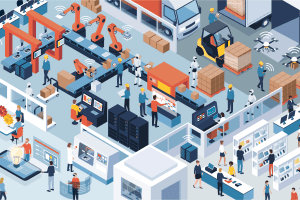Scaleup Spotlight: Mobius Labs is taking its tech to outer space

Berlin-based Mobius Labs gives computer vision an edge by fostering innovation in the middle of a pandemic. Its CEO and co-founder, Appu Shaji, joins us as we continue our Scaleup Spotlight to discuss how his team is making visual AI ready for mass adoption.
Hi Appu. Could you tell us a little bit more about the team behind Mobius Labs?
We are a Berlin-based, fun-loving set of geeks who are really passionate about figuring out how to give the power of sight to machines and create value created when a machine has the capacity to see.
We have created a next-gen, AI-powered computer vision solution that removes the boundaries of adoption and empowers any enterprise to supercharge their applications, devices or processes to turn visual content into insight and business value.
What sets you apart from your competitors?
What makes us different is that we continue to push the boundaries of the technology by focusing on accessibility, efficiency and on giving our clients full control of their data.
We created a no-code AI solution which actually makes the technology accessible to non-technical users. This not only means using AI, it also means our computer vision models can be trained by end users who have no computer science or engineering skills.

Efficiency is also a key differentiating factor for us. Our next-generation algorithms can be deployed on any possible device, from powerful servers to extremely low-power devices. They can all benefit from our powerful computer vision solution.
We have also developed a solution that keeps our client in the driver’s seat. Frequently, tech companies make their customers part of their product by expecting them to provide training data. However, we promise that we will never see our clients data. This is possible because we worked on learning methodologies that do not require training data from our clients, making our models smarter in an unsupervised or semi-supervised way. This ensures our clients have full ownership and control over their data.
I understand that you have made great strides during the COVID-19 pandemic. Could you tell me a little bit more?
We have had several very exciting milestones that we accomplished during the COVID-19 pandemic. The first one would be surpassing the EUR€1mn ARR mark earlier this year. We also continued innovating during these past months to deliver our latest feature, Superhuman Search. This is a visual search solution that doesn’t rely on metadata and runs out of the box as a no-code solution. This is a completely new and revolutionary way to work with visual content.
Our current technology is also extremely suitable for edge deployment in various interesting use cases. For example, in the space industry, we have started working with satellite manufactures, drone companies, and other edge providers to help them better understand their visual content. We’re thrilled to be able to take our technology to outer space!
Though you’ve achieved a lot of success during the pandemic, were there any challenges your team initially faced in adapting to the outbreak of COVID-19?
COVID-19 forced us to redefine the commercialisation of our product completely. Before the pandemic, we met people face to face at events, for example, and really engaged with them to fully understand their needs. When all the events and conferences stopped, we quickly switched to a fully digital commercial model. We discovered ways to build trust with our audiences and listen to what the market was looking for via digital channels.
The pandemic also presented a great challenge for our company culture. Previously we didn’t really have a remote working culture. So when cases started rising and it was clear that this was a severe health risk, we had to pivot quickly into a remote working culture. In fact, we were one of the first companies in Berlin whose entire team was working remotely, becoming a fully virtual organisation by the third week of March 2020.
How do you see the industry changing in a post-COVID-19 world?
The future is hybrid: a mixture of what we used to have pre-COVID and what we have currently. Office spaces will allow us to connect with people personally because social interaction is important, and remote working will be an enabler for productivity and getting things done. Ultimately, we hope everyone will have a better work-life balance.
Another thing that became apparent is that people were forced to adopt digital technology faster. Industries and societies that were not used to leveraging these digital tools had to do so and implement them very quickly.
We see the mass adoption inflexion point regarding computer vision coming up soon, and you will see computer vision solutions in almost every camera, satellite, or other edge devices. It will become something ubiquitous, and our goal as a company is to power all these applications.
READ MORE:
- Vodafone and Enterprise Nation to give free digital skills training to 100,000 small businesses
- SpaceX breaks records and sends meme-inspired crypto into space
- Paving the way for green technology
- The Lithuanian unicorn challenging the likes of Depop and Facebook Marketplace
Discussing technology’s social impact will also become more relevant, and it is important to engage with everyone in an open conversation about the roles and responsibilities of technology. Digital solutions have made social life easier in a post-COVID scenario. For example, if we didn’t have video conferencing, we would be worse off today. Finding that balance is significant.
About Appu Shaji
CEO and Co-founder

Appu has over 18 years of experience in computer vision and AI. He has started three companies and founded Mobius Labs in 2018 to take computer vision to every application. He previously headed AI teams at EyeEm and has co-authored highly cited academic publications.
For more news from Top Business Tech, don’t forget to subscribe to our daily bulletin!
